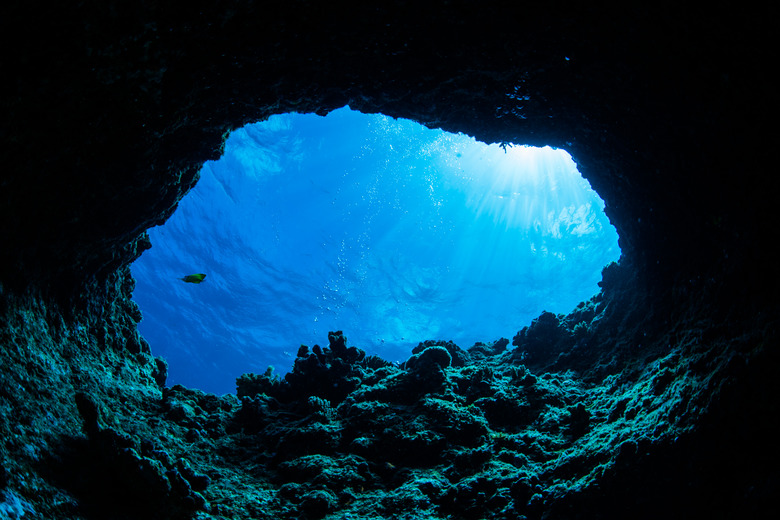Can The Ocean's Pressure Crush You?
The Earth's atmosphere presses on you everywhere you go — assuming you aren't an astronaut. You probably don't notice how strongly the air is pushing on you, because humans have evolved to have our interior pressure match exterior pressure. If you ascend a mountain you might notice some pops in your ears as the balance between internal and external pressure changes. Underwater, the change in pressure is far more rapid as you descend, which throws off the balance even more rapidly. Any part of you that's filled with air will not be able to compensate, and you'll be crushed.
Pressure
Pressure
The gravitational field attracts all matter towards the center of the Earth. The reason everything doesn't fall into the center of the Earth is that everything "pushes back." For example, a rock at the top of a mountain doesn't fall into the Earth's center because the strength of the structure of the mountain balances the force of gravity on the rock. In the same way, a blob of air at the top of the atmosphere doesn't fall down because the air underneath it pushes back. But as you move lower in the atmosphere, there's a bigger stack of air above you, so the lower air needs to push back harder. By the time you get to sea level, the lower air is pushing at a pressure of about 15 pounds per square inch.
Water Pressure
Water Pressure
The same thing happens with water. The top of the ocean stays at the top because the water underneath is holding it up. That means the water pressure has to increase the further you descend beneath the surface. But water is much heavier than air, so the pressure increases much more rapidly. For every 33 feet you descend, the pressure increases about another 15 pounds per square inch. That is, 33 feet of water press down as much as the entire thickness of the atmosphere.
What Pressure Can Do
What Pressure Can Do
Several simple laboratory demonstrations show the power of atmospheric pressure. For example, if the air in a metal 55-gallon drum is heated, lowering its pressure, and then the drum is sealed and cooled, it will collapse in on itself. The difference between the pressure inside and the pressure outside is enough to crush the steel. And that's just from the pressure of the air.
Your lungs are pushed on by the pressure of the air, the same as the 55-gallon drum. In the air, your lungs have the same internal pressure as the outside atmosphere, so your rib cage doesn't collapse. Thirty-three feet under the ocean, the external pressure is twice the internal pressure, and your only protection will be the strength of the bones in your rib cage.
Being Crushed
Being Crushed
Your body is filled with vessels and channels that carry fluids — not only your blood, but others as well. As the pressure builds, your liquid-filled tissues will not collapse, because liquids can have higher pressure and not shrink in volume. But your tissues aren't designed for that pressure, so they'll rupture at some point.
You may not need to worry about that, though, because air does not stay at the same volume as the pressure increases. It shrinks. So at some depth the pressure will build up so much that your rib cage cannot maintain its structure. As your rib cage collapses it will push the air into a much smaller space — which will raise the pressure in the air, so it will push back. But it will be too late for you: your lungs and any other air-filled regions in your body will be crushed.
References
Cite This Article
MLA
Gaughan, Richard. "Can The Ocean's Pressure Crush You?" sciencing.com, https://www.sciencing.com/can-oceans-pressure-crush-you-12458/. 9 March 2018.
APA
Gaughan, Richard. (2018, March 9). Can The Ocean's Pressure Crush You?. sciencing.com. Retrieved from https://www.sciencing.com/can-oceans-pressure-crush-you-12458/
Chicago
Gaughan, Richard. Can The Ocean's Pressure Crush You? last modified March 24, 2022. https://www.sciencing.com/can-oceans-pressure-crush-you-12458/
